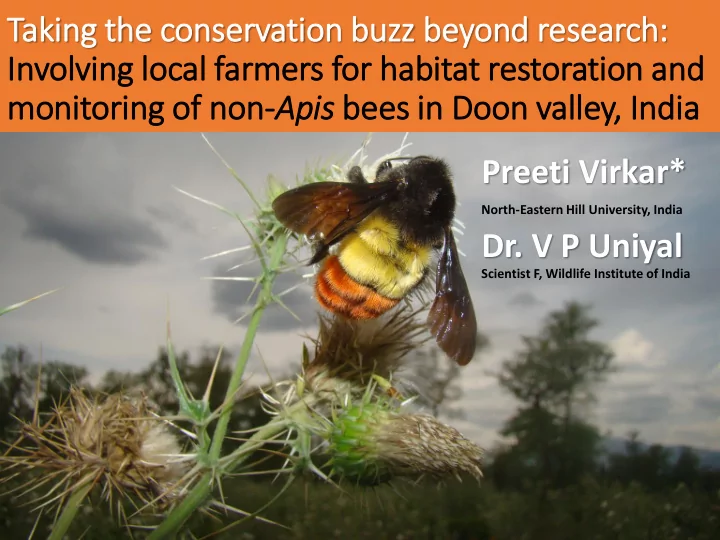

Taking th the conserv rvation buzz beyond research: In Involving lo local farmers for habitat restoration and monitoring of f non- Apis bees in in Doon valley, In India Preeti Virkar* North-Eastern Hill University, India Dr. V P Uniyal Scientist F, Wildlife Institute of India
Land-use land cover change in India (Tian et al. 2014)
Water Pan Traps Observation Sampling of bees (Westphal et al., 2008)
RESULTS • 6.3% bees - Indian subcontinent: 43 species, 5 families • Compositions of agroecosystems overlap greatly with forests • > 50% rare bees species, Forest specialists (26%), Generalists (9%), no agro-eco. Specialists • Agro-eco. bees prefer polycultures
https://www.facebook.com/PreetiSVirkarPitulee/vid eos/vb.100001267281709/2479191038799781/
https://www.rufford.org/projects /preeti_virkar
Future Projections 1. Involving more farmers, forest managers and citizens 2. Preparing short documentaries on pollinators, their role and conservation 3. Assessment based habitat restoration measures involving farmers 4. Monitoring tools for long-term conservation- seasonal and annual 5. Establishing a database repository on social media 6. Replication of the model
Acknowledgement • Intern, volunteers • Farmers of Doon Valley, India • Friends and colleagues • Rufford Small Grant, Navdnaya Trust, ICCB and HCMF • Dr. Eric Mader, Xerces Society, USA • Mr. SS Rasaily, Uttarakhand State Biodiveristy Board, India • Dr. Debjani Dey, Indian Agriculture Research Institute, New Delhi, India THANK YOU
Contributed Session Abstracts ABSTRACT SUBMISSION-2542 Taking the conservation buzz beyond research: Involving local farmers for habitat restoration and monitoring of non- Apis bees in Doon valley, India Preeti S. Virkar * 1 , Virendra P Uniyal 2 1 North Eastern Hill University, 2 Wildlife Institute of India, India Please choose one of the ICCB themes from the menu to assist us in selecting an appropriate session for your presentation.: Making an impact by mobilizing local community participation in conservation efforts Sub-theme first choice: Disciplines: Category first choice: Community-driven conservation Sub-theme second choice: Ecosystems Category second choice: Sustainable agriculture Sub-theme third choice: Methods Category third choice: Conservation capacity building Please indicate your presentation preference: Oral Presentation Alternate presentation format: If your preferred format cannot be accommodated, would you wish to have your abstract considered for another presentation format? : Speed Presentation Are you an SCB member? : No Are you a student?: No Do you plan to request travel support from SCB? : Yes Are you comfortable presenting in English? : Yes Do you have any accessibility accommodation requests? Please list them below:: No Is your abstract part of a symposium?: No I am willing to review abstracts: Yes Abstract: Non-Apis bees form the vast majority of insect pollinators, however neglected due to no direct human interactions and monetary befits similar to Apis bees. We studied the bee diversity in agroecosystems and natural areas in Doon valley, India. Doon is a subtropical-temperate landscape situated at the foothills of the outer Himalayas, a global biodiversity hotspot. Observations and pantrap sampling were used to collect data. We recorded 43 bee species and 91% of those were non-Apis. Doon valley harboured 25 rare non- Apis species of bees and 11 species were habitat specialist to the natural areas (clamtest; Specialization threshold K= 2/3, alpha= 0.005). We found that natural habitats around Doon valley supported bee communities in nearby agroecosystems (R 2 = 0.782, SE = 0.148, P = 0.004). Polyculture farms mimic natural habitats and support more non-Apis species compared to monocultures (Kruskal Wallis test; p < 0.001). Thus, diversity of crops/plants and bee species is interrelated and depend on each other. Conservation of non-Apis bee requires enhancement of farmers’ knowledge and their active participation. Therefore, we have started a follow-up project on assessment and enhancement of non-Apis bee habitats in agroecosystems of Doon valley. The project involves long term capacity building programs for stakeholders such as farmers and managers and involving them in the identification of habitats, possible threats, habitat restoration and diversity monitoring. Social Media Summary - to be used in promoting ICCB : Non-Apis bees depend on natural habitats and polyculture farms. Hence, farmers are roped-in for their conservation in Doon valley, India.
Recommend
More recommend